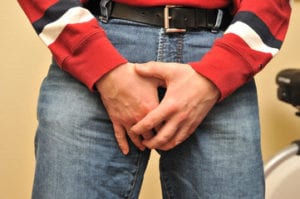Urinary Incontinence after Prostate Surgery: Regaining Control

What to Know about Post-Prostatectomy Incontinence
The mere idea of leaking urine can cause anxiety. Men facing prostate surgery can rest assured that bladder control problems are very unlikely to involve mass amounts of urine. Like women who encounter stress urinary incontinence, men are more likely to experience a slight leak or drip during strenuous activity.
When normal continence exists before prostate surgery, we expect the patient to regain optimal bladder function within about a year after their procedure. However, some patients will still experience leakage after one year. While there is no way to guarantee 100 percent restoration of all functions, the advanced techniques that are utilized in prostate procedures significantly increase our chance of reaching our treatment objective.
Kegels for Men?
Men may only know what Kegel exercises are by hearing the term from a woman in their life. Kegel exercises are a form of pelvic floor exercise. Men have muscles along their pelvic floor, too, and they are also responsible for aiding in bladder control. Men who are scheduled for prostate surgery may be encouraged to begin performing these exercises (squeezing the muscle that would stop the flow of urine) prior to their procedure as a way to pre-condition the sphincter muscle for faster recovery. That being said, Kegel exercises can’t solve urinary incontinence, and other treatment options are available if you are still experiencing leaking.
When to Get Help
Dr. Shridharani and our team are here to assist patients through their prostate surgery recovery. We are happy to answer questions and provide assistance if urinary incontinence does not improve as expected. In some instances, medication to reduce the frequency or sensation of urination may be prescribed. 10-30% of patients struggle with urinary incontinence for longer than a year. If you are experiencing long-term incontinence that lasts more than 12 months you should contact a doctor, as additional treatment options are available.
Prostate surgery may be a necessity for overall health, but it is not acceptable for a man to lose his sexual wellness or continence after his procedure. To discuss concerns related to post-prostatectomy urinary incontinence, call our Chattanooga office at (423) 778-4MEN (4636). We’re here to help.


